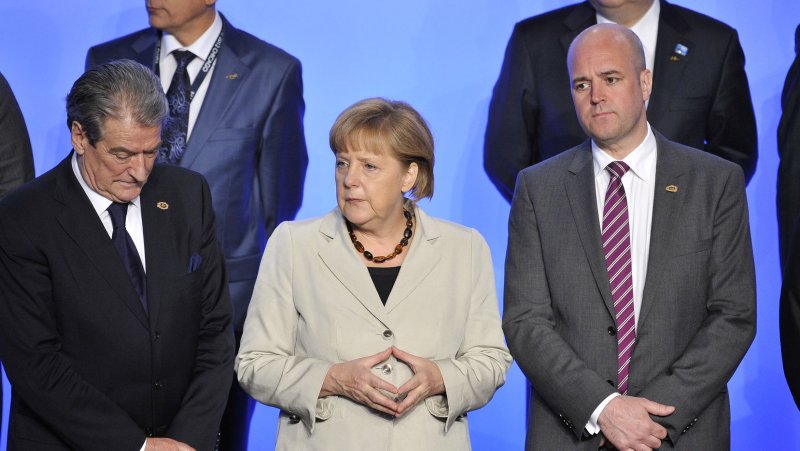Albanian President Bamir Topi (L-R), German Chancellor Angela Merkel and Swedish Prime Minister Fredrik Reinfeldt at the 2012 NATO Summit on May 21, 2012 in Chicago. Are Merkel and her European Union becoming a federation? UPI/Brian Kersey |
License Photo
Europe is inching closer toward a federalist-style economic system with a central power overseeing 27 separate states, like the United States, but different.
Washington does not have power over state budgets in the manner that Europe appears to be endorsing -- or about to endorse -- but instead manages the affairs in state capitals with an economic carrot and a stick. If states comply with federal laws x, y and z, then they are awarded money for highways, schools, environmental clean-up and other necessities. This is harmony through financing. It works as well as it works.
Europe is studying how to integrate financing for mutual protection, like a herd of wildebeests grouping together when lions go on the prowl. But there is a difference, given Germany, France, Spain, Italy, Britain and 21 other members of the European Union do not want to demote their national leaders to the role of governors and, NATO alliance aside, they would each like to keep as much autonomy as they can.
So the question is how to integrate without raising just one flag over the continent. And, certainly, the right group of lawyers should be able to figure this out. It's just too bad there wasn't a call for a eurobond, a banking union and a mutual, region-wide tax 11 years ago when the common currency was first introduced. But to sell the idea of a euro then involved extensive safeguards against loss of autonomy. Simplifying trade was the selling point, not placing all the banks in Europe under the authority of one regulator.
"The world wants to know how we expect the political union to complement the currency union," German Chancellor Angela Merkel told a news conference. "We have to find an answer in the foreseeable future," she said.
From the point of view of investment: Sooner, rather than later, sounds like a good idea.
In international markets Tuesday, the Nikkei 225 index in Japan gained 1.04 percent while the Shanghai composite index in China climbed 0.15 percent. The Hang Seng index in Hong Kong gained 0.4 percent while the Sensex in India added 0.2 percent.
The S&P/ASX 200 in Australia rose 1.47 percent.
In midday trading in Europe, the FTSE 100 index in Britain slipped 1.14 percent while the DAX 30 in Germany fell 0.73 percent. The CAC 40 in France added 0.82 percent while the Stoxx Europe 600 rose 0.23 percent.















